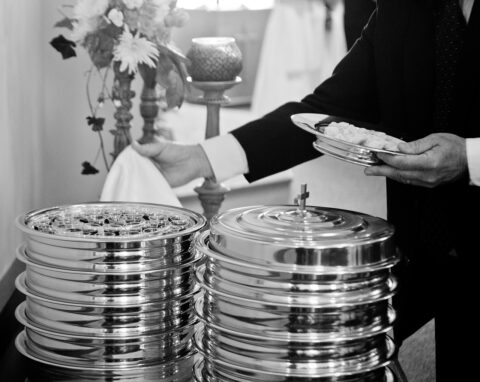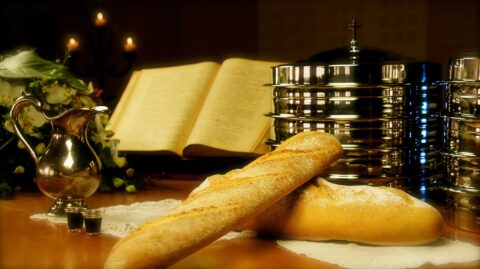One of the ways unhealthy churches cause members unnecessary angst is the manner in which they teach communion. For many, even though they are now away from their former churches, they still cannot take part in communion. There are some who never overcome the fear instilled in them that they could be bringing damnation upon themselves. For them, the experience of communion has been ruined. Others are able to do so only after much trepidation, prayer and agonizing over their standing with God.
In some of these churches, the pastor has to give approval of anyone wishing to take communion. Some give rules that must be followed. There is the issue of whether grape juice or wine is to be used. Others will forbid people from taking part in communion at other churches where they feel it isn’t properly taught or handled.
There is nothing in the Bible that says a pastor or leader is to approve of anyone taking communion. There is no check-off list for believers to do prior to partaking. If you have placed your faith in Jesus, you are free to take communion. We do it in remembrance of Jesus. It is not to be something feared, dreaded or worrisome.
The believers in Corinth were very messed up. (For a brief synopsis of what it was like, read this.) They suffered from divisions, quarrels, jealousy and sexual immorality. They were carnal, with some being proud and arrogant. At times gatherings were disorderly. The apostle Paul considered them to be worldly and like infants in Christ, instead of mature believers. This was the scenario when Paul addressed those at Corinth concerning communion. You will find no other warning about communion anywhere else in the New Testament. It was specific to the situation among these believers.
Despite this, for years some ministers have twisted 1 Corinthians 11 into something Paul never meant nor taught. This is what Paul had heard about them concerning communion (NLT): “When you meet together, you are not really interested in the Lord’s Supper. For some of you hurry to eat your own meal without sharing with others. As a result, some go hungry while others get drunk. What? Don’t you have your own homes for eating and drinking? Or do you really want to disgrace God’s church and shame the poor? What am I supposed to say? Do you want me to praise you? Well, I certainly will not praise you for this!”
Do you see it? They were not viewing communion properly as it seemed to be treated like any other meal and some became drunk, something certainly not part of communion. Others went without, due to some not considering those that did not have anything to eat. THIS is what Paul addressed. They had turned communion into something foreign to what they had been taught. It had nothing to do with a checklist. It had nothing to do with praying through first or making sure you had repented of any and all possible sin. It wasn’t about those things at all. But unhealthy churches distort what happened in order to create FEAR in people—and they have a much better chance of controlling and manipulating you when it is present. Fear permeates the teachings in unhealthy churches.
This is what Paul taught about the reason for communion (NLT): For I pass on to you what I received from the Lord himself. On the night when he was betrayed, the Lord Jesus took some bread and gave thanks to God for it. Then he broke it in pieces and said, “This is my body, which is given for you. Do this in remembrance of me.” In the same way, he took the cup of wine after supper, saying, “This cup is the new covenant between God and his people—an agreement confirmed with my blood. Do this in remembrance of me as often as you drink it.” For every time you eat this bread and drink this cup, you are announcing the Lord’s death until he comes again.
The celebration of Passover became the Christian time of communion and was to be done in remembrance of Jesus. We remember that he gave his life for us and brought a new covenant with God. Through the years it seems to have lost the closeness brought by sharing a meal together compared to how most churches celebrate today.
While Paul does go on to mention taking communion ‘unworthily/unworthy’ and that they should ‘examine themselves’ beforehand, his instructions had nothing to do with what some ministers teach today, that one has to pray through and make sure they have no sin in their life. He isn’t saying believers need to be fearful of taking part in communion. Remember the overall state of the believers at Corinth and how Paul stated that when they met together they weren’t really interested in the Lord’s Supper. The NASB puts it like this, “Therefore when you meet together, it is not to eat the Lord’s Supper, for in your eating each one takes his own supper first; and one is hungry and another is drunk.” While their gathering together was to celebrate the Lord’s Supper, they had a total disregard for others as they scarfed down the meal and became drunk, starting before everyone arrived, and doing so while others had little or nothing to eat and drink. They made the taking of communion to be disgraceful by their selfishness, inconsideration and drunkenness.
Consider how Paul closed his comments to them and hopefully it will help you to see where the emphasis was placed when he wrote to the Corinthians. (NLT) “So, my dear brothers and sisters, when you gather for the Lord’s Supper, wait for each other. If you are really hungry, eat at home so you won’t bring judgment upon yourselves when you meet together.” Can you better see it now?
For those having difficulty in this area, consider having your own personal time of communion away from a church setting, either by yourself or with family. It may help you to ease back into being able to participate in a church setting. There are no rules on how frequently a believer is to take communion and there is nothing condemning those who do not take it.
********
Shop at our Amazon store! As an Amazon Influencer, this website earns from qualifying purchases.





